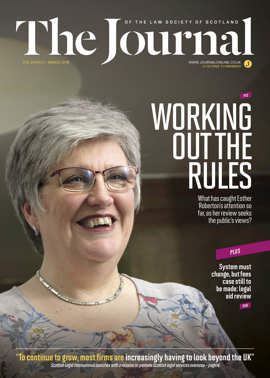Health check for doctors' lines

Failure to appear for medical reasons
A very useful and detailed decision from Sheriff Cubie sitting in the Sheriff Appeal Court sets out in detail the considerations relevant when a party fails to appear for apparent medical reasons.
The circumstances in McCallion v Apache North Sea Ltd [2018] SAC(Civ) 1 (27 December 2017) were that the pursuer’s solicitors had withdrawn from acting. The pursuer had received intimation of the peremptory diet, had failed to attend, and the action was in consequence dismissed. He had further made no contact with the court after intimation was received. The first appeal diet was discharged as a result of the pursuer intimating his unfitness to attend. In terms of that interlocutor, he was ordered to provide a report from his general practitioner or consultant to address specifically his failure to appear at the peremptory diet and the first appeal diet. He produced three letters relating to his medical condition at the subsequent appeal hearing. These were from a mental health link worker, his GP and a counselling service.
Sheriff Cubie first reiterated that in circumstances such as the present, in which a party was seeking to be reponed, the appeal court was required to exercise its discretion having regard to all the circumstances. It required to consider the explanation provided, the stage proceedings had reached, the material available, the interests of justice, and what conditions as to expenses or otherwise might be imposed.
Reviewing the authorities relating to medical reasons for non-appearance, Sheriff Cubie distilled various considerations which were applicable. First, the decision to adjourn or continue in the absence of a purportedly unfit litigant was an exercise of discretion. Similarly, whether to accept any proffered medical evidence was an exercise of discretion. In the instance of party litigants, a court should be slow to refuse an application to adjourn a hearing on the first occasion. The decision, however, was one for the court. The court could not be forced to adjourn such a hearing. Any medical documentation provided did not have to be “on soul and conscience”. However, any documentation which was not “on soul and conscience” might be afforded less weight. The court should have some confidence that what was provided was an independent opinion after proper examination.
Any medical certificate required to be examined carefully. A certificate of “unfitness to attend” was not conclusive evidence of that. The court required to decide whether a person was unfit and what the consequences were. The court had to consider the certificate and all the relevant circumstances, including the conduct of the case and the nature of the party’s engagement in the litigation.
Unfitness for work did not equate with unfitness to attend court to conduct a litigation. A medical certificate should identify the medical attendant and detail the author’s familiarity with the litigant’s medical condition, along with all recent consultations. The health condition should be specified and its nature and extent detailed; also for how long the condition had been suffered and its likely future duration. A reasoned prognosis should be provided. The particular features of the condition preventing attendance and participation in the court process should be identified. Effective participation in the court process was not simply determined by reference to any medical condition but also the issues before the court and the role the party would undertake. The prospects of success might be of significance.
Whether the issues in question related to case management or a final decision on the merits was relevant, with the court requiring to be more cautious in the latter case.
In the present litigation the documentation provided no explanation for the failure to appear at the peremptory diet. The pursuer had been given chances to provide satisfactory medical certification and had failed to do so. In addition, he had been able to communicate with the defenders’ agents and travel to a meeting to discuss the case. He was unable to pay any award of expenses which might be made if the appeal was allowed. Sheriff Cubie refused the appeal.
Dispensing power
In Lilburn v Pensions Ombudsman [2018] CSIH 2 (15 December 2017) Lord Carloway confirmed that the dispensing power to relieve a party of the consequences of a mistake, oversight or other excusable cause is not normally available to reverse an action which has been deliberately been taken by a party.
Expert witnesses
Sheriff Braid’s decision in D v Victim Support Scotland [2017] SC EDIN 85 (20 December 2017) is an example of the parameters regarding expert witnesses set out in Kennedy v Cordia (Services) 2016 SC(UKSC) 59 in operation. The pursuer sought damages for inadequate advice tendered by an employee of the defenders in respect of the pursuer’s claim for compensation from the Criminal Injuries Compensation Authority. The defenders attempted to lead evidence from a solicitor purportedly speaking to normal practice for advisers such as the defenders. Sheriff Braid refused to admit the evidence. The proposed witness did not have the relevant knowledge and experience to qualify him to provide relevant factual evidence which would be of assistance. His opinion evidence related to the matter which the court had to decide and thus usurped the function of the court.
Appeals
In Firm of Barry and Susan Peart v Promontoria (Henrico) Ltd [2018] CSIH 1; 2018 SLT 93 Lady Dorrian determined that in a litigation in which an interim interdict had been granted, an appeal could be competently taken against the grant of that order, notwithstanding the defenders had not at the time entered appearance. The words “unless the context requires otherwise” in RCS, rule 1.3 qualified the definition of “party” in that rule. Further, the lodging of a caveat by the defenders rendered them a party in terms of rule 23.1. Intimation in terms of that rule required to be made to the defenders as a party. There do not appear to be any equivalent provisions affecting the sheriff and Sheriff Appeal Court.
In PQ v Glasgow City Council [2018] CSIH 5 (17 January 2018) Lord Brodie, delivering the opinion of the division, noted that the function of the grounds of appeal and the note of argument was different. The former required to be both brief and specific. The propositions made in the grounds of appeal were statements containing a premise which the appellant proposed to make out and which, if made out to the court’s satisfaction, would result in the success of the appeal. The grounds provided notice to the other parties and the court of the grounds on which the appeal would be argued. A note of argument provided an outline of the argument to be advanced in support of the grounds of appeal. It was a concise summary of the submissions to be made. It set out a numbered list of points under reference to passages of evidence, documents and authorities. The note of argument was more expansive than the grounds of appeal, though “concise” meant exactly that.
Expenses
Respondents’ motions for expenses in unsuccessful petitions for permanence orders by Perth and Kinross Council, Petrs [2018] CSOH 6 (30 January 2018) were refused by Lord Brailsford. In such applications expenses were not normally awarded against an unsuccessful local authority unless their conduct of the court process could be classed as a matter of fact as being reprehensible or it could be shown that the authority adopted an unreasonable stance in the proceedings. Generally, such behaviour could be categorised as conducting the proceedings irresponsibly. These requirements were laid down as authorities in such applications were pursuing statutory duties imposed on them in relation to the care of children. Further, respondents were normally publicly funded in any event.
In J & E Shepherd v Letley [2018] CSIH 8 (2 February 2018) the division required to resolve a number of issues regarding expenses. While the details are case specific, Lord Brodie, speaking for the court, observed first that, in dealing with a motion for an uplift in fees, the employment of counsel might reduce the force of the complexity of the cause argument, counsel being expected to take the responsibility of addressing any legal difficulties etc, which might arise. In then considering the operation of the “expenses following success” principle, Lord Brodie observed that success was defined broadly and was measured by outcome rather than totting up arguments won and lost. There was scope to discriminate among different procedural stages in a litigation in considering how expenses should be dealt with. At certain stages if success had been qualified or divided, there were consequences for expenses. Expenses might be modified or refused depending on the manner in which a party had conducted a stage in the litigation. There was an expectation that parties conducted themselves with due economy and avoiding unnecessary cost. This consideration applied irrespective of the role of the auditor of court. Expenses could again be modified if an appeal was successful on a point not argued before the lower court.
Heritable actions
In Promontoria (Henrico) Ltd v Portico Holdings (Scotland) [2018] SC GRE 5 (24 August 2017), Sheriff Hamilton repelled a submission that the pursuers had no title to sue to exercise remedies to enforce various standard securities. The securities had been granted in favour of a bank which had then assigned them to the pursuers. The defenders argued that the assignation did not conform to the statutory form in terms of the Conveyancing and Feudal Reform (Scotland) Act 1970. The assignation covered 34 securities which were not for fixed sums. Attempts were made to describe the extent of the security assigned. There was an ongoing dispute between the parties as to the exact level of the debt. The adaption to the style in the legislation was understandable and reasonable and was as close as might be to the style. Even if the assignation did not conform with the form in terms of the legislation, the defenders knew to whom the debt was assigned and money was due to the pursuers. The defenders’ obligations were the same as those owed to the bank. The assignation, even if it did not conform with the legislation, did not prejudice the defenders in any way.
In this issue
- Borrowings, partner capital and profitability
- GDPR and the cloud
- Employment claims: is the flood still to come?
- Contributory fault: drivers, cyclists and pedestrians
- Reading for pleasure
- Opinion: Derek McCabe
- Book reviews
- Profile: Siobhan Kahmann
- President's column
- Application changes coming
- People on the move
- Seeking a better way
- Beyond borders
- Drawings and profitability
- Enforceable rights or progressive policy goals?
- Conflict theory: it works
- What the liquidators don't tell you
- The office on the move
- Please can we have some more?
- Health check for doctors' lines
- When creditors come first
- Keeping goods exclusive
- Tenant Farming Commissioner: the story so far
- HSE appeals: experts allowed in
- Scottish Solicitors' Discipline Tribunal
- Please don't stop the music
- Broadcasting's business end
- Public policy highlights
- Scam warnings escalate
- This time it's personal
- The game's not a bogey!
- "Only amateurs attack machines; professionals target people"
- When estate agents need client ID
- Banks, client accounts and the Money Laundering Regulations
- Third party rights: what now?
- Ask Ash






